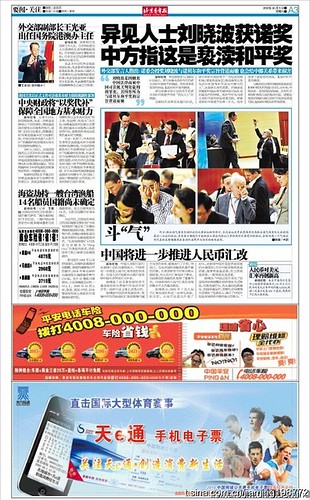
圖片說明: 網上流傳十月九日北京青年報a3版的版樣, 大標題為:異見人士劉曉波獲諾獎 / 中方指是褻瀆和平獎。未知是否明天會印行的版面。
諾貝爾委員會新聞稿:劉曉波判刑令他成為人權鬥爭象徵
挪威諾貝爾委員會決定將二零一零年的諾貝爾和平獎授與劉曉波,以表揚他多年來在中國爭取基本人權的非暴力抗爭。挪威諾貝爾委員會一直相信,人權和和平是緊密相連的。這些權利是實現艾爾弗雷德諾貝爾在遺囑中提到的「民族團結友好」的必要條件。
在過去幾十年,中國取得了史無前例的經濟發展。中國現在已是全球第二大經濟體;數以百萬計人民得以脫貧。政治參與的範圍亦擴闊了。
新的地位代表中國需要承擔更多責任。作為簽署國,中國政府違反了多條國際協議,也違反了自己承諾給予人民的政治權利。中國憲法第三十五條指明「中華人民共和國公民有言論、出版、集會、結社、游行、示威的自由」。實際上,中國人民在實踐這些自由時受到很大的限制。
在過去二十多年來,劉曉波一直是爭取在中國落實基本人權的重要推動者。一九八九年,他參與了天安門示威;他是《零八憲章》的主要草擬者。憲章在二零零八年十二月十日、即聯合國國際人權公約訂立六十周年當日發表。翌年,劉曉波以「煽動顛覆國家政權」的罪名被判監十一年、剝奪政治權利兩年。劉曉波一直堅稱,對他的裁決違反了中華人民共和國憲法和基本人權。
很多中國人在國內外投身落實普世人權的運動。劉曉波受到的懲罰,正好令他成為這場廣大的中國人權鬥爭的象徵。
奧斯陸,二零一零年十月九日
編按:譯文標題由譯者所加
英文原文:
The Nobel Peace Prize for 2010
The Norwegian Nobel Committee has decided to award the Nobel Peace Prize for 2010 to Liu Xiaobo for his long and non-violent struggle for fundamental human rights in China. The Norwegian Nobel Committee has long believed that there is a close connection between human rights and peace. Such rights are a prerequisite for the "fraternity between nations" of which Alfred Nobel wrote in his will.
Over the past decades, China has achieved economic advances to which history can hardly show any equal. The country now has the world's second largest economy; hundreds of millions of people have been lifted out of poverty. Scope for political participation has also broadened.
China's new status must entail increased responsibility. China is in breach of several international agreements to which it is a signatory, as well as of its own provisions concerning political rights. Article 35 of China's constitution lays down that "Citizens of the People's Republic of China enjoy freedom of speech, of the press, of assembly, of association, of procession and of demonstration". In practice, these freedoms have proved to be distinctly curtailed for China's citizens.
For over two decades, Liu Xiaobo has been a strong spokesman for the application of fundamental human rights also in China. He took part in the Tiananmen protests in 1989; he was a leading author behind Charter 08, the manifesto of such rights in China which was published on the 60th anniversary of the United Nations' Universal Declaration of Human Rights, the 10th of December 2008. The following year, Liu was sentenced to eleven years in prison and two years' deprivation of political rights for “inciting subversion of state power". Liu has consistently maintained that the sentence violates both China's own constitution and fundamental human rights.
The campaign to establish universal human rights also in China is being waged by many Chinese, both in China itself and abroad. Through the severe punishment meted out to him, Liu has become the foremost symbol of this wide-ranging struggle for human rights in China.
Oslo, October 8, 2010
圖片集:劉曉波獲獎當晚,一批港人到中聯辦示威,要求釋放劉曉波及所有在囚的維權及民運人士。


